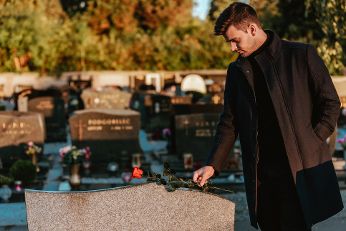
Being allowed to grieve
“At the start it’s just shock, and people don’t want to take it in,” the advisor tells us. “Then at one point they realise that the person they loved isn’t coming back and has disappeared from their lives forever.” In the early months of the initial, deep processing of the grief it’s the family, relatives and friends who are there and who help to distract the person, grieve with them and support them. “The problem is just that after a certain amount of time you're just left alone. Life goes on as usual for everyone else – as it needs to. But the person grieving hasn’t got that far yet,” explains Dorfer.
At that point everything starts to get really difficult. This is particularly true if it’s a partner who is no longer there – someone you miss in day-to-day life. People don’t just experience endlessly deep grief; they also experience anger. Anger that the other person has left them alone. “At that point they need a protected structure so they can feel well looked after. A place where they can grieve at the top of their voices, but they can also swear – where anything is allowed,” says the advisor. This could be a counseling center.
Dorfer also recommends rituals to combat the grief. This could be a diary where feelings are noted down every day, or a journal dedicated to the person who has died. “Write down everything you think about related to that person. Positive experiences, but less good ones too.”
Death is generally a taboo in society. People often don’t know how to talk to someone who has lost a close relative. Comments such as “look to the future – life goes on” mean well but are hard to deal with.
If someone needs support with their grief, they are welcome to contact one of the Austrian family counseling centers.
Our interview partner
Silke Dorfer is a family advisor for the Institute of Family Counseling and Psychotherapy (IFP) in Leoben, Styria. She is a qualified marriage, family and life counselor and has a qualification in educational and youth counseling.
Institut für Familienberatung und Psychotherapie (IFP)
Hofmanngasse 7
8700 Leoben
Website IFP
The interview was conducted in November 2021.


